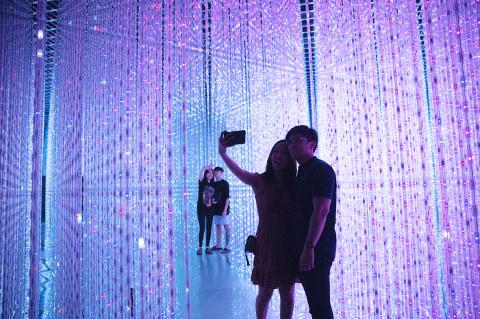“I used to torture frogs when I was young,” the man was telling me, with a stare that would make the most experienced serial killer uneasy.
I wasn’t at a Halloween party. It was Friday night in London and I was attending my first singles event. When my friend suggested it, I had expected the evening to be awkward. I hadn’t expected to be nursing a glass of a wine while a stranger described the many brutal ways he had culled the north London amphibian population. After two hours of painful conversation with other guests, we eventually escaped, although not before our new friend leaned in for a bum grope.
I was unlucky at this mixer. But even when attendees don’t turn out to be on an RSPCA watch list, singles events can feel more forced than a 90s school disco. I am not alone in my phobia of organized mixers; a recent survey by the Inner Circle revealed that 41 percent of daters in the UK would refuse to attend one, citing embarrassment and awkwardness as the main reasons.

Photo: EPA-EFE
Yet despite people’s preconceptions, the dating app company hasn’t been deterred. It holds 55 events a year, including parties, skiing trips and bingo. The average number of party attendees doubled to more than 300 between 2018 and last year, suggesting the events are more popular than ever.
Meanwhile, more traditional event organizers are seeing a rise in demand, with SpeedDater running 70 events a month across 23 cities in the UK.
“We are trying to break down the stigma,” says Sarah Payne, the events manager at SpeedDater Events. “There used to be a big stigma about online dating but that has gone now. It is completely normal to meet online and we’d like to see the same thing happen with events. We do speed dating, but we also run parties, cooking classes and wine tasting.”
FACE-TO-FACE INTERACTION
As people develop “app-based dating fatigue,” singles events are making a comeback.
“Apps are very appearance-based and events give people the chance to get a better idea of who a person is. People might be unsure about attending them, but then find they enjoy the face-to-face interaction.”
Lynn, a 58-year-old life coach from Liverpool, turned to speed dating after becoming disillusioned with Tinder.
“A few years ago, people were enthusiastic on apps and wanted to meet up, but that doesn’t seem to happen now,” she says. “I tried speed dating, because it’s a faster version of apps and you get to meet lots of different people.”
Although she hasn’t found any serious romantic prospects, she has had fun and made new friends.
“You can’t take it too seriously or expect too much. You might have to meet a huge number of people to find someone you are actually compatible with,” Lynn says.
Some dating companies are putting a spin on singles mixers with events such as naked speed dating or pheromone dating, where people can try to sniff their way to true love. For Alice, 28, a copywriter from Reading, these gimmicks can be fun, but they aren’t likely to lead to love.
“I went naked speed dating because I thought it would be something different,” she says. “Usually, women’s tickets for dating events sell out faster than the men’s tickets, but the opposite was true for this.”
She chose to wear her underwear, although many people were naked. While she admits there was a novelty factor, it is not something she will repeat in a hurry.
“There was a weird guy there and a woman told me he was touching himself during the event, which was uncomfortable. I think it might be a good way to meet people if you are into exhibitionism, but I’m not sure it was for me.”
Alice is unconvinced that any type of speed dating leads to love. Instead, she prefers to attend general meet-up groups, where there is no pressure to look for a partner.
“I think it’s better when things develop organically. Although some dating events have been OK, I tend to find the women are much more up for it and the men aren’t really people I’d go for.”
The desire for organic interaction is something dating companies are aware of, and it has led to a surge in the number of activity events for singles. In 2017, Charlie Spokes set up her own dating business, My Friend Charlie, after a conversation with her mum sparked the idea.
“She couldn’t understand why I wasn’t dating people I met in real life. Whenever I went out, I’d go for dinner, speak to friends and come home,” she says. “I wanted to start something where people could meet up, enjoy an activity and actually talk to each other.”
The company has run more than 150 quirky events across Manchester, London and Bristol, including sunset cycling, quizzes, darts and axe throwing.
Paul, a 36-year-old IT consultant from Manchester, has attended several of Charlie’s events.
“I gave up with online dating after putting lots of effort into my responses and getting no replies. So far, all the events I’ve tried have been good. You can talk about the activity you’re doing, which breaks the ice, especially if it’s something unusual.”
He also believes you get a better picture of a person when you meet face-to-face.
“You can’t hide behind a screen and pretend to be something you’re not. You have to be yourself.” Like Lynn he hasn’t found any dating prospects yet, but remains optimistic.
COMMODITIZING LOVE
In the past, dating apps, event companies and Web sites have come under fire for commoditizing the search for love. Advertised by pearly toothed sex gods, they charge a heavy premium to find a “soulmate.” And although many Web sites and event organizers cite great success rates in uniting couples, ultimately they are businesses, not magic love machines. If everyone found their fairytale ending on the first attempt, profits would decline.
Jordi Sinclair, who runs Smudged Lipstick Events, says it’s important to be honest about what you are selling.
“We don’t promise anyone they will find love,” he says. “We promise to put on great events, where you’ll meet new people and try something different. We have also found that it’s a misconception that all single people are desperately hunting for The One. Sometimes they want to meet other singles with similar interests, especially if lots of their friends are married.”
As well as life drawing, Jenga dating and dirty Scrabble, the company runs an open mic night where people can come and share their dating war stories.
“We put a lot of effort into choosing good venues and hosts. We also ban people from using phones to encourage interaction and get everyone talking.”
While dating events are increasingly popular in big cities, there are fewer options available for older people and gay singles.
“A lot of the experience-based meet-ups aren’t in my area,” Lynn says. “For the over-50s, there isn’t much choice and there’s virtually nothing for people in their 60s and older. Dating is a numbers game, but that can be hard when there aren’t many options to meet people who are a similar age to you.”
Andrew, 36, a London-based advertising specialist, says there is less variety for same-sex events, too.
“I tried a gay-speed-dating event once, but I ended up getting really drunk. The only person I matched with was the man I met outside when I was smoking.”
Likening the experience to “human scrolling,” he found the process artificial and awkward.
However, he would be keen to try activity events if more existed for gay singles.
“There are lots of meet-up groups for gay people, but I haven’t seen many fun same-sex events specifically for singles. I’d definitely like to see companies setting these up.”
While SpeedDater already offers same-sex events, newer companies including My Friend Charlie and Smudged Lipstick Events are hoping to expand their offering to attract a wider range of people.
As for me, I’m determined to put frog man behind me and keep an open mind. I might not meet The One, but there’s always wine, gin and throwing axes at strangers.

Sept.16 to Sept. 22 The “anti-communist train” with then-president Chiang Kai-shek’s (蔣介石) face plastered on the engine puffed along the “sugar railway” (糖業鐵路) in May 1955, drawing enthusiastic crowds at 103 stops covering nearly 1,200km. An estimated 1.58 million spectators were treated to propaganda films, plays and received free sugar products. By this time, the state-run Taiwan Sugar Corporation (台糖, Taisugar) had managed to connect the previously separate east-west lines established by Japanese-era sugar factories, allowing the anti-communist train to travel easily from Taichung to Pingtung’s Donggang Township (東港). Last Sunday’s feature (Taiwan in Time: The sugar express) covered the inauguration of the

The corruption cases surrounding former Taipei Mayor and Taiwan People’s Party (TPP) head Ko Wen-je (柯文哲) are just one item in the endless cycle of noise and fuss obscuring Taiwan’s deep and urgent structural and social problems. Even the case itself, as James Baron observed in an excellent piece at the Diplomat last week, is only one manifestation of the greater problem of deep-rooted corruption in land development. Last week the government announced a program to permit 25,000 foreign university students, primarily from the Philippines, Indonesia and Malaysia, to work in Taiwan after graduation for 2-4 years. That number is a

This year’s Michelin Gourmand Bib sported 16 new entries in the 126-strong Taiwan directory. The fight for the best braised pork rice and the crispiest scallion pancake painstakingly continued, but what stood out in the lineup this year? Pang Taqueria (胖塔可利亞); Taiwan’s first Michelin-recommended Mexican restaurant. Chef Charles Chen (陳治宇) is a self-confessed Americophile, earning his chef whites at a fine-dining Latin-American fusion restaurant. But what makes this Xinyi (信義) spot stand head and shoulders above Taipei’s existing Mexican offerings? The authenticity. The produce. The care. AUTHENTIC EATS In my time on the island, I have caved too many times to

In a stark demonstration of how award-winning breakthroughs can come from the most unlikely directions, researchers have won an Ig Nobel prize for discovering that mammals can breathe through their anuses. After a series of tests on mice, rats and pigs, Japanese scientists found the animals absorb oxygen delivered through the rectum, work that underpins a clinical trial to see whether the procedure can treat respiratory failure. The team is among 10 recognized in this year’s Ig Nobel awards (see below for more), the irreverent accolades given for achievements that “first make people laugh, and then make them think.” They are not